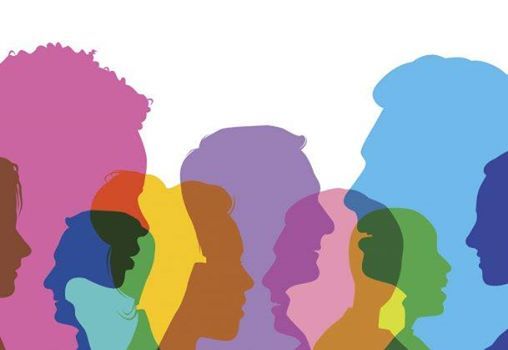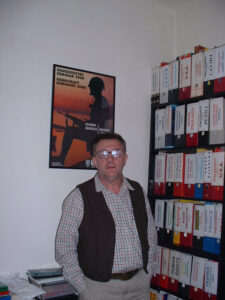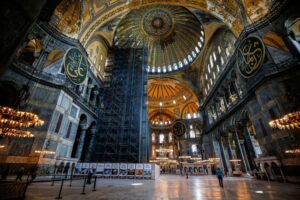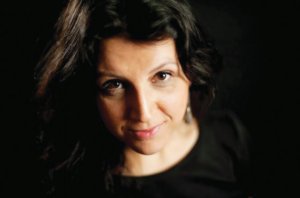Amila Kahrović Posavljak was born in Sarajevo, 1984. She survived three and a half years of siege as a child and it made a huge impact on her work. She graduated at the Faculty of Philosophy in Sarajevo and got a degree Master of sciences in literature history. She worked as a political journalist but then left journalist engagement in order to start writing literature. She published poetry book Koščice (Little Bones) in 2016, and got a prestigious regional Mak Dizar award. Her first novel Smrtova djeca (Deaths children) was published in 2017, got award Excellence in Literature (USA) and is now being translated into English. She also wrote papers in literary theory and interpretations in publications indexed in approved scientific basis. Amila Kahrović Posavljak lives and works in Sarajevo.
It’s been more than twenty years since the end of the war(s) in the Former Yugoslavia and ten years since the Council of Europe issued The White Paper on Intercultural Dialogue. This paper emerged out of practical experience and was clearly intended to provide a solution to the management of cultural diversity in Europe. Instead of multiculturalism, which relied simply on co-existence, interculturalism demanded exchange between different cultures. Although the paper has some opportunities for improvement and deserves a critical read, it provides positive and useful guidance for intercultural advocates. However, the terms used in the paper are circulating in post-Yugoslav countries without being truly applied, let alone critically (re)thought. It seems much easier to repeat expressions such as “intercultural dialogue”, “tolerance”, and “culture of remembrance”, than to actually address and resolve the real problems that sit behind these substantive words.
Consequently, young people in the area, which is usually given the neutral name of “region”, are mostly left alone with their confusions about the war(s) of the 90’s, despite the existence of so many initiatives. In theory, there are so many things that “should-have-been-done”, but in practice, very little has actually been done to address the basic needs and questions of the post-war youth. And, to escape the paradox of having to explain the harsh context, together with present, and related, political and juridical problems, public opinion makers widely agree to adopt an intercultural approach, while ignoring this context.
Three youth societies
When I was in Serbia last year and compared it with my experience in Bosnia and Hercegovina, I finally understood the structure of the post-conflict youth. This generation of youth is divided into three major groups, unfortunately, along the lines they inherited from their parents, who are mostly war participants.
The first group contains the youth who radically celebrate war crimes. A classic example would be the Serbian young people gathered around ultra-nationalist parties, associations, and major football fan groups. They celebrate war crimes and the idea of Great Serbia, glorifying the genocide of Srebrenica (denied and interpreted as an act of self-defence) and chanting fascist songs and other songs that threaten minority groups. Those young people are usually supported by the governments of the Bosnian entity, Republic Srpska (very openly) and of Serbia (not very openly). It is concerning that the students’ dormitory in Pale, near Sarajevo, is named after Radovan Karadzic. And, that the students were happy with this decision, taken by the Republic Srpska government. Very few voices have actually spoken about the students’ culture of denial or their celebration of war criminals. The tragedy for the entire post-war Bosnian society is that students celebrating Radovan Karadzic are accepted simply as a natural outcome of the war.
The second group of youth, in the post-war generation, are those who don’t have adequate information. The culture of denial is very strong. Although there are many organizations dealing with the past, the official narrative is far away from dealing with it in reality. The vast majority of these young people have never heard of the serious war crimes in Bosnia and Kosovo, such as ethnic cleansing in Prijedor or Tomašica – the biggest mass grave in Europe after World War II. Speaking about war crimes and seeing those young people understand and become convinced is very important. And so is their decision to make war crimes a topic that matters.
Spending a few days in Novi Sad, I had an opportunity to speak to young poets and one of them – a refugee from Croatia – paraphrased the horrors that she saw as a Serb child during 1995. Yet she cried when I spoke about the experience of growing up in besieged Sarajevo. She told me how uncomfortable she feels about the crimes done in the name of the Serbian people, even though she herself was a true victim. This brings me to the third youth group – the direct victims of the war(s). In Bosnia and Herzegovina thousands of young people are still searching for the bones of their parents in different mass-graves, particularly in Eastern Bosnia, ethnically cleansed from Bosniaks during the war. They are still victims. Yet civil society and academics insist they must leave behind their victimized state in order to open up for the intercultural approach. This seems quite insensitive. Who can demand that a young person – a returnee in Prijedor still searching for the bones of his or her brothers and sisters – should forget they are a victim and engage with a culture that celebrates crimes?
For whom the dialogue tolls?
Such false intercultural demands for reconciliation are both irrational and unfair. Something doesn’t fit. Even the very general and diplomatic demands from documents such as The White Paper have not been applied. For example, the rule of law (there are war criminals in governing structures), learning proper history which would prevent Holocaust and genocide denial, a neutral and objective media that is regulated fairly (some of the major TV stations deliberately disrespect the memorial mourning day for Srebrenica and this goes mostly unpunished by the different regulatory committees). A demand of the Paper is that interculturalism – unlike multiculturalism – should leave no place for moral relativism. Yet war crime denial is seen as one of the narratives – a point that actually makes it legitimate. Is there a harder example of real moral relativism?
All of this is present in the everyday life and politics of the post-conflict societies in the Balkans. Instead of resolving the cases of war crimes and their ideological basis, in order to make a proper place for intercultural dialogue, there is an insistence on dialogue itself, never mind the context.
By acting like this, peace builders – valuable as they can be – are (deliberately or not) putting aside the context of the people they are trying to approach. This non-contextualized and unreasonable kind of behaviour creates distance between them and the young people with whom they speak. It is apparent that this approach also causes frustration – in preparing this article I spoke to a few young victims – because the majority of the cases of all war crimes in former Yugoslavia remain unresolved. Unpunished war crimes and the demand that the genocide survivors and their perpetrators are equally guilty – in the name of non-contextualized intercultural dialogue – can only generate frustration and encourage war crime worshippers. Demanding victims stop being victims – although the war criminals are alive and happy and the territorial outcomes of the war persist – is aggravating, forcing those who have suffered, deeper into victimhood and making these young victimized people a perfect gift to nationalists. Indeed, this is a likely explanation for the fact that some of the victims are moving closer to their own nationalism.
Intercultural dialogue is necessary, but the social, political and juridical base has to be prepared. This kind of easy avoidance of the social, political and juridical context is the natural bedfellow of rising nationalism and national tension. Instead of resolving the major ideological issues and those related to war crimes in particular, this approach maintains the social status quo and leaves the culture of denial untouched. This is not a nutritious soil for the next generation of youth. Without a particular context and the resolution of major political and judiciary problems, the demand for intercultural dialogue may simply not work, and instead of dialogue, society may develop a misleading symmetry between war criminals and their victims. That kind of social structure – as we are taught by history – is the best pledge for future conflict and crime.
(Amila Kahrović Posavljak)








No comment